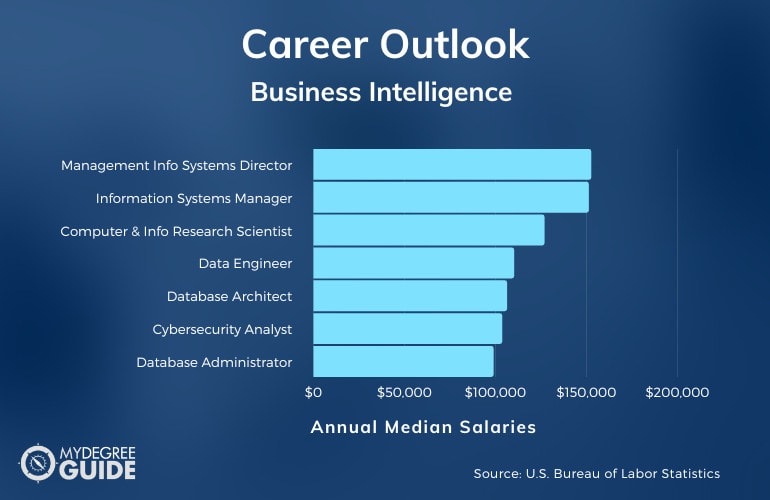In this technology-driven age, businesses are capable of gathering large amounts of data about consumers, advertising, product sales and more. Data on its own doesn’t do much good, though.

Companies need professionals with the ability to analyze the data and apply their findings toward sound business decisions. With a master’s degree in business intelligence, you may fill that in-demand role.
According to the Bureau of Labor Statistics, jobs in the computer and information technology sector will increase by 531,200 positions through the next 10 years. Data collection is expected to play a large role in that increase.
Editorial Listing ShortCode:
To be on the cutting edge of this field, further your education with an online business intelligence graduate degree. Online classes in business intelligence deliver quality coursework to your laptop computer so you may earn your master’s degree in a format that fits your busy schedule.
Universities Offering Masters in Business Intelligence Degree Online
Methodology: The following school list is in alphabetical order. To be included, a college or university must be regionally accredited and offer degree programs online or in a hybrid format. In addition, some colleges offer GRE waivers or do not require exam scores for admission.
1. Arizona State University
With more than 350 undergraduate degree programs and more than 450 graduate, doctorate, and certificate programs, Arizona State University is a leader in research and innovation.
Founded in 1886, this public educational institution continues to grow and discover new ways to help solve global issues that relate to economic, community, social, and health issues faced by many.
- Master’s in Business Analytics
Business, engineering, and sustainability are just a few of their high-level degree programs.
ASU has been continuously accredited by the Higher Learning Commission.
2. Bellevue University
Established in 1966, Bellevue University began providing quality education as a public university known for a variety of curriculum.
BU has accredited bachelorette and master’s, and doctorate programs in business, education, science, intelligence, and more. Their distance learning programs offer a flexible way for students worldwide to achieve their educational goals. Bellevue has rated as one of the nation’s top military-friendly institutions by Military Times.
- Master’s in Business Analytics
Bellevue is regionally accredited by the Higher Learning Commission.
3. Boston University
Established in 1839, Boston University is one of the top private research institutions by U.S. News & World Report with seventeen schools across three campuses.
BU reaches students on a global level; with their distance learning program, they have students in more than 100 countries. Boston offers a pathway to undergraduate, graduate, or doctorate degrees in more than 300 programs of study. Samples of the degree programs offered include information technology, biostatistics, astrophysics, computer science, and more.
- Master’s in Applied Business Analytics
BU is accredited by the New England Commission of Higher Education.
4. DeVry University
DeVry University is a private educational facility that has been offering a pathway to success since 1931. They have a multitude of degree programs that lead to associate and bachelor’s degrees.
DeVry University specializes in designing business, technology, and healthcare education and specialty concentrations in each field. They merged with the Keller Graduate School of Management in 1987 and now offer Master level degree programs.
- MBA – Business Intelligence and Analytics Management
They have more than forty campuses, but most of their programs are also online.
DeVry is accredited by The Higher Learning Commission (HLC).
5. Drexel University
Drexel University is a private postsecondary school that began in 1891. Through their many undergraduates, graduate, and doctorate degrees programs, Drexel students get real-life, hands-on educational experiences world-renowned comprehensive research university.
DU has programs in many disciplines and allows students to participate in international networking through their use of global classrooms, internships, and study abroad programs. They also give students work experience to help with resume building by offering co-op opportunities that equate to work experience.
- Master’s in Business Analytics
Drexel is regionally accredited by the Middle States Commission on Higher Education (MSCHE).
6. Franklin University
Franklin University is one of the largest private universities in the state of Ohio. Founded in 1902 as a way for the YMCA to assist community members to a solid education, Franklin University has grown into a well-established global university with campuses and online classes all over the world.
FU has a variety of degree programs ranging from business, computer science, criminal justice, and many more that lead to either a bachelor, master’s, or doctorate.
- Master’s in Business Analytics
Franklin is fully-accredited by the Higher Learning Commission (HLC).
7. Georgetown University
As a prestigious educational facility that started in 1789, Georgetown University is the oldest Catholic and Jesuit private university in the nation.
Using a holistic approach to education, Georgetown University offers an array of educational opportunities in more than 100 countries. GU has several campus locations, online degrees, and a hospital. The areas of study at Georgetown are vast, but each program is rich with research and innovation that leads to a bachelor, masters, doctorate, JD, LLM, or MD degree.
- Master’s in Applied Intelligence
Georgetown is accredited by the Middle States Commission on Higher Education.
8. Golden Gate University
Golden Gate University is a private education facility that began in 1901. Offering more than sixty academic programs, Golden Gate University has a pathway to undergraduate, graduate, and law degrees.
With programs such as information technology, business, marketing, psychology, and more, GGU serves students in more than fifty counties. They are also military friendly and belong to the Yellow Ribbon Program.
- Master’s in Business Analytics
GGU has been accredited on an institution-wide basis by the Western Association of Schools and Colleges (WASC) since 1959.
9. Grand Canyon University
Founded in 1949, Grand Canyon University is a private Christian university that offers educational opportunities to students across nine colleges and through online studies.
With more than 200 educational programs that can lead to either a bachelor’s, master’s, or doctoral degree, business, medical science, language and communication, engineering, and technology are just a few of the programs found at Grand Canyon University.
- Master’s in Business Analytics
GCU is regionally accredited by the Higher Learning Commission.
10. Indiana University
As one of the nation’s foremost research universities, Indiana University began in 1820 and has grown to be a leader in global public education.
With campuses and medical facilities across the state of Indiana, IU offers all levels of degree programs ranging from an associate to doctorate programs in a vast array of academic disciplines including business, music, law, nursing, education, and international studies.
They were the world’s first school in philanthropy, America’s first school for informatics.
- Master’s in Business Analytics
IU is accredited by The Higher Learning Commission.
11. National University
Established in 1971 by a Navy Captain to order to bring education to working adults, National University is a private postsecondary school that offers over seventy-five-degree programs.
With the potential to earn an associate, bachelor’s, and master’s, or doctoral degree, National University brings flexible options to students all over the world. NU has more than twenty campuses and online programs offering majors such as business, education, STEM programs, and more.
- Master’s in Business Analytics
NU is accredited by the WASC Senior College and University Commission.
12. Ohio University
Founded in 1804, Ohio University is the oldest university in the state. As a public research university, Ohio U serves students in six continents by offering online classes, a choice of several campuses, and volunteer study options for thousands of students.
Known for their innovations in research and technology, Ohio University researchers have almost 100 patents. They have over 250 academic programs that can lead to bachelor’s, master’s, or doctoral degrees.
- Master’s in Business Analytics
Ohio University is regionally accredited by the Higher Learning Commission.
13. Penn State World Campus
Penn State World Campus has been providing an online education experience to students around the world through distance learning since 1998.
As one of the biggest college campuses in the Penn State University system, Penn State World Campus offers over 150 degrees that allow students to earn an associate’s, bachelor’s, master’s, or doctorate entirely online.
This nationally recognized university offers many programs, including business, cybersecurity, education, and much more.
- Master’s in Data Analytics – Business Analytics
Penn State Online is accredited by the Middle States Commission on Higher Education.
14. Regent University
Regent University is a private Christian university that began in 1977 as a Christian Broadcasting Network school in Virginia Beach. Today, they are a global community that offers education to students of all religious denominations through on-campus and online degree programs.
Regent University has degree programs that led to an associate, bachelor’s, master’s, doctoral, and law degrees. They offer a diverse field of study for an array of students, including programs in National security, business, education, and many others.
- Master’s in Business Analytics
Regent is accredited by the Southern Association of Colleges and Schools Commission on Colleges.
15. Seattle University
Seattle University is a private Jesuit Catholic university that began in 1891 and is the most prominent independent college in that region of the United States.
With undergraduate and graduate programs in eight different schools and colleges, Seattle helps students earn a bachelor’s, master’s, or doctorate in a variety of program majors.
Some of the program options are business, computer science, engineering, and philosophy, but there are many more options for students.
- Master’s in Business Analytics
SeattleU is accredited by the Northwest Commission on Colleges and Universities.
16. Southern New Hampshire University
Reaching thousands of students globally, Southern New Hampshire University began in 1932 as a small college offering education in accounting and secretarial science.
Since then, they have grown into a sizable private educational facility offering more than 200 programs, from certificates to doctorate degrees in disciplines such as business, education, liberal arts, social sciences, and many more. They also have one of the lowest tuition rates in the nation.
- MBA – Business Intelligence
SNHU is accredited by the New England Commission of Higher Education.
17. Syracuse University
Working to make the world a better place, Syracuse University started in 1870 and grew into a large, global, private research university.
Syracuse University’s main campus is located in New York, but they reach thousands of students all over the world every year. Syracuse University has programs in a variety of programs that lead to bachelor, master’s, and doctoral degrees.
- Master’s in Business Analytics
SU is accredited by the Middle States Commission on Higher Education.
18. University of Colorado – Boulder
Established in 1876, the University of Colorado – Boulder is a research university that strives to bring innovation into reality to bring positive change on a global level.
Offering undergraduate, graduate, and postgraduate studies, the University of Colorado-Boulder have advanced programs that lead to degrees in a multitude of majors, including aerospace engineering, biochemistry, business, technology, and more.
They are the number one public university recipient of NASA research.
- Master’s in Business Analytics
CU-Boulder is accredited by the Higher Learning Commission (HLC).
19. University of Colorado – Denver
The University of Colorado- Denver is a well-known public medical research educational facility that began in 1912.
They offer many degree programs that can lead to a bachelor’s, master’s, or doctorate. The school encourages students to become involved in research that can assist with local and international issues to make a positive difference.
University of Colorado -Denver strives to work in urban areas and low-income areas to help provide medical care to those in need.
- Master’s in Information Systems – Business Intelligence Systems
CU-Denver is regionally accredited by the Higher Learning Commission.
20. University of Maryland
Established in 1807, the University of Maryland is a large public university that is dedicated to research and innovation to better the community on a global level.
With schools in dentistry, law, medicine, nursing, pharmacy, and social work, the University of Maryland has over sixty pathways to bachelors, masters, and doctoral degrees.
They have in-class and online programs that enhance their dedication to public health, law, and human services.
- Master’s in Business Analytics
UMD is accredited by the Middle States Commission on Higher Education (MSCHE), under the authority of the U.S. Department of Education.
21. University of Massachusetts – Amherst
Established in 1863, the University of Massachusetts- Amherst is a public research university that as gained national recognition for offering an assortment of undergraduate, graduate, and professional degrees.
Known for its distance learning degree programs, UMass Amherst reaches thousands of students around the world and is a military-friendly institute.
They have a diverse array of programs, including Afro-American Studies, biomedical science, business analytics, linguistics, and much more.
- MBA – Business Analytics
UMass-Amherst is accredited by the New England Commission of Higher Education (NECHE).
22. University of West Florida
The University of West Florida began in 1963 as a public postsecondary school on the coast of Florida. UWF has more than eighty program majors that can lead to an undergraduate, graduate, or doctoral degree.
With campuses and students all over the world, the University of West Florida prides itself on its diversity and commitment to global change. Some of the research done at UWF involves making efforts to reduce the carbon footprint of humans, inequalities, terrorism, and world hunger.
- MBA – Business Analytics
UWF is accredited by the Southern Association of Colleges and Schools Commission on Colleges.
23. University of Wisconsin – Whitewater
Founded in 1868, University of Wisconsin – Whitewater is a public university that offers a variety of degree programs, both on-campus and online.
U of W is the second-oldest teacher’s college in Wisconsin, and their excellent education department expresses this. They have over 50-degree programs, three of which are graduate programs. Research opportunities are vast on campus and are encouraged by the university in the form of financial scholarships and course credits.
- MBA – Data Analytics
UWW is regionally accredited by the Higher Learning Commission.
24. Villanova University
Established in 1842, Villanova University is a Catholic university that helps build critical thinkers and ethical leaders to help bring positive change to the world.
Villanova University allows students to participate in their education by way of on-campus and online studies. Business, engineering, and nursing are a few of the thousands of programs that can help students gain the knowledge they need to become professionals in their field, leading to an associate, bachelors, masters, doctorate, or law degree.
- Master’s in Analytics
Villanova is accredited by the Middle States Commission on Higher Education.
25. Wake Forest University
Instituted in 1834, Wake Forest University is a private university located in North Carolina that leads the way in research to help enhance the medical, technology, science, and business fields.
WFU offers degrees in undergraduate, graduate, and postgraduate education to train new leaders to foster positive change on a global level. Wake Forest is world-renowned in for its innovations in the medical, law, and business community.
- Master’s in Business Analytics
WFU is accredited by the Commission on Colleges of the Southern Association of Colleges and Schools.
What Is an Online Master’s in Business Intelligence Degree?

Students in business intelligence online degree programs spend much of their time studying data. The objective is to become experts at handling business data in order to improve organizations.
Students will learn to:
- Collect data in efficient and ethical ways
- Store data in organized fashions
- Analyze data for trends, patterns and other insights
- Create business applications for their findings
Success in this field requires students to be both business-minded and technology-savvy. By pairing those two skill sets, practitioners are able to do the practical work of gathering and organizing data as well as the more theoretical work of drawing reliable analyses and decisions from the data.

Online studies present the same curriculum that students would receive in a campus-based business intelligence master’s program. The digital classroom may use recorded lectures, readings, multimedia presentations, discussion boards and other tools to help students engage with the material.
Assignments are likely to be similar to those given in traditional business intelligence classes. An online approach to master’s studies is beneficial because it may allow you to complete coursework when and where it works for your schedule.
After earning your online business intelligence master’s degree, you may be prepared for management or analytics positions in the business world. You might choose to work in a field like energy, manufacturing or transportation, and your in-demand expertise may provide plenty of career opportunities.
Business Intelligence Courses

When you study for a master’s degree in business intelligence, your classes can help prepare you to work with data. Much of your time will be spent learning how to acquire, categorize and apply data. You might also learn about business principles and computer science.
Sample courses include:
- Data Science and Analytics – In this class, you’ll learn how to think through challenges related to data applications. You’ll discuss topics like visualization and statistics.
- Data Visualization – This class will cover how you can use tools to transform data into useful models that others can understand.
- Decisions with Data – All businesses must make decisions on a regular basis. In this class, you’ll explore how to integrate data with financial and economic principles in order to arrive at sound conclusions about the next steps to take.
- Introduction to Business Analytics and Intelligence – Why is business intelligence important? This foundational class will seek to answer that question and provide an overview of business principles that relate to this field.
- Introduction to Data Mining – To get started with your master’s studies, you’ll need a foundational class in which you learn to uncover patterns in data.
- Quantitative and Qualitative Decisions – This class will cover various decision-making approaches, including forecasting future trends and analyzing statistics.
- Risk Analysis – You’ll learn how to use statistical data to make informed predictions about costs and benefits.
For your master’s program, you may be able to select an area of concentration, such as Cyber Analytics, Data Science or Data Analytics. If so, you’ll take a mix of core courses and classes that focus on your particular area of specialization. You may also have the option to enroll in electives to help tailor your program of study.
Careers and Salary

Business intelligence is a quickly growing field, so job opportunities may abound for people with the right training. You may use your degree to find a position in the business world; many graduates land finance jobs.
Other industries, including manufacturing, healthcare, and education, may also be able to make use of the knowledge that you’ll gain from your business intelligence master’s program.
Potential job titles may include:
- Business intelligence analyst – You can provide leadership to companies by collecting data and looking for patterns or trends. This category of employees can also include business intelligence managers and directors who supervise team members.
- Cybersecurity analyst – You can put your technology skills to work by helping companies protect their networks. Your work will help guard systems and the sensitive data that they contain.
- Data engineer – As a data engineer, you’ll use your knowledge about software engineering to build data processing systems.
- Database administrator – You could become a database administrator who is responsible for storing and organizing a company’s data.
- Database architect – The architect is the person responsible for designing the systems that are used to store and organize data in useable fashions.
- Information research scientist – You can improve the technology and systems used for data collection and analysis as a research scientist.
- Information systems manager – This management role will give you the responsibility of overseeing the computer networks or database systems in an organization.
- Financial analyst – In this career, you’ll use your advanced data skills to help make financial decisions. You may evaluate trends and goals to help businesses or individuals make smart investment choices.
- Management analyst – As an operations or management analyst, you can rely on data and intelligence to determine whether businesses are running efficiently. Your guidance can help improve spending and productivity.
Salaries
On average, here’s what you can expect to earn annually in these positions, according to the Bureau of Labor Statistics:
| Careers | Annual Median Salary |
| Management Information Systems Director | $152,480 |
| Information Systems Manager | $151,150 |
| Computer and Information Research Scientist | $126,830 |
| Data Engineer | $110,140 |
| Database Architect | $106,260 |
| Cybersecurity Analyst | $103,590 |
| Database Administrator | $98,860 |
| Business Intelligence Analyst | $98,230 |
| Management Analyst | $87,660 |
| Financial Analyst | $83,660 |
Accreditation

There are three types of accreditation to consider when searching for an online program for a master’s in business intelligence.
Regional accreditation is a must-have because it shows that a university meets basic standards for educational quality. Select organizations, such as the Higher Learning Commission (HLC), are approved by the Council for Higher Education Accreditation (CHEA) to grant regional accreditation.
National accreditation may not be as critical. Even still, when attending online classes, it can be smart to look for a school that’s approved by the Distance Education Accrediting Commission (DEAC).
Programmatic or industry-specific accreditation evaluates whether a school’s particular program meets the highest standards of that field.
Although this isn’t essential, you may want to look for a college whose business analytics program is accredited by the Association to Advance Collegiate Schools of Business (AACSB) or the Accreditation Council for Business Schools and Programs (ACBSP).
Financial Aid

You don’t have to attend a campus-based college to qualify for financial aid. Online business intelligence students can receive many of the same types of aid as traditional students.
The most common source of funding help is the federal government. You may be able to take out low-interest loans or receive grants that you don’t have to pay back. The work-study program may pair you up with a job site where you can earn money for school.
To learn more about your eligibility, start by filling out the FAFSA. This form may help you qualify for state financial aid as well.
To further reduce the cost of your online tuition, look into payment plans or scholarships from your school. You may also be able to secure scholarships or fellowships from private sources. Merit-based scholarships go to people because of their accomplishments, and need-based scholarships are given to those with financial burdens.
Professional Organizations

Joining a professional organization is an excellent way to build connections with others in the field. The more networking that you do during school, the more resources you may have at your disposal after graduation.
Belonging to professional associations may also grant you access to industry news, trade publications, continuing education opportunities, job listings, product discounts, message boards, and other benefits. Many organizations offer special rates for students.
Organizations to consider include:
- Association for Information Science and Technology
- CompTIA Association of Information Technology Professionals
- Computing Research Association
- Data Management Association International
- IEEE Computer Society
- Institute for Operations Research and the Management Sciences
- Institute of Electrical and Electronics Engineers
- International Association for Social Science Information Services and Technology
- Research Data Alliance
- Strategic and Competitive Intelligence Professionals
Business intelligence professionals often have a wide range of industry organizations available to them. You could join the one that best fits your interests or choose several for a well-rounded perspective on the field.

How Long Does It Take to Complete an Online Masters in Business Analytics?
On average, students finish business intelligence master’s programs in about two years. Accelerated formats with fast-track classes and low credit-hour requirements may speed up the pace. Some online programs offer start dates throughout the year so you may begin your program right away and earn your masters fast.
What Is the Difference Between Business Intelligence vs. Business Analytics?

There is a good deal of overlap between business intelligence and business analytics, and experts don’t always agree on the distinctions.
In general, business intelligence deals with using data to evaluate past business decisions and learn from them. The focus may be on presenting data in ways that make sense to others in the organization.
A Master’s in Business Analytics uses data to spot trends and make future predictions. This often involves a good deal of modeling to transform raw data into meaningful insights.
Because the lines between these two business degree disciplines are rather blurred, many schools offer degree programs that combine both intelligence and analytics.
What Does a Business Intelligence Architect Do?

Business intelligence architecture is a subset of business intelligence analytics. Architects design the structures that are used for data collection and storage in an organization. This may include databases and data warehouses. Software engineering skills can help a business intelligence architect create structures that operate efficiently and link with past systems.
What Can You Do with a Master in Business Analytics?
The skills taught in master’s in business analytics programs are in demand. When you hold this degree, there’s a good chance that you may work as an analyst. Common job titles are financial analyst, management analyst, and business intelligence analyst. You may also be an information research scientist or a database architect.
Why Would You Choose a Degree in Business Analytics?

If you have an aptitude for both business and technology, a business analytics career may be an ideal way to merge those two areas of interest. Job availability is high in this sector because companies are looking for experts to oversee their processes for collecting and applying data.
Getting Your Master’s in Business Intelligence Degree Online

Industry leaders predict that for the next decade, there will be over 67,200 new job listings for data experts (Bureau of Labor Statistics). You may develop the skills that companies are looking for when you enroll in a graduate program for business intelligence. Once you graduate, organizations might turn to you to lead their data and analytics departments, and they may pay well for your expertise.
An online master’s degree program may provide a flexible way to further your education without putting the rest of your life on hold. The sooner you submit college applications, the sooner you may be on your way to a lucrative career in business intelligence and analytics.
Related Guides:

